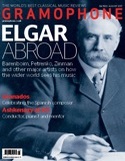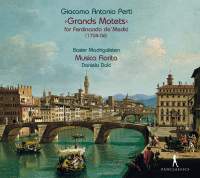Texte paru dans: / Appeared in: |
|
|
Outil de traduction (Très approximatif) |
|
|
Reviewer: David Vickers Giacomo Antonio Perti (1661-1756) was maestro di cappella of Bologna’s prestigious San Petronio for nearly 60 years but moonlighted occasionally. In particular, he was commissioned by Prince Ferdinando de’ Medici to compose numerous operas for the Florentine court’s private theatre at Pratolino (all lost) and a series of largescale motets to be sung the day after the birthday of Grand Duke Cosimo III. Three of these composed between 1704 and 1706 are performed by the Basler Madrigalisten and Musica Fiorita, directed from the organ by Daniela Dolci. Rodolfo Zitellini’s booklet note calls them ‘the delicate union of operatic style and grandiose church music’, and suggests that Perti was able to experiment more liberally than he could in Bologna. Intriguingly, the inclusion of archaic cornetts in several of the grands motets was requested by Prince Ferdinando – and they combine with a pair of natural trumpets to strikingly regal effect in the opening of Cantate laeta carmina; the one-voice-per-part choir is initially over-powered but masterly arias are attractively varied: the partnership of the bass Raitis Grigalis and trumpeter Jean-François Madeuf has sparkling buoyancy (‘Tubarum sonitus’), and upper strings provide weightless support for the soprano Cristina Grifone’s intelligent declamation (‘O columba speciosa’). Date melos, date honores contains a lovely minorkey siciliano for soprano and strings (‘Quam dulce repetit’), a graceful description of flowers flourishing on the banks of the Arno (‘Flores Arni’, in which the countertenor Flavio Ferri-Benedetti spars elegantly with florid obbligato violin), and the agitated ‘Fremunt tartara’ generates dynamic excitement from Musica Fiorita’s strings and Grifone’s precise coloratura; the magnificent closing eight-part chorus has a central contrapuntal section that is the equal of the finest solemn church music by Lotti or Scarlatti. Gaudeamus omnes has a charming pastoral for soprano and strings (‘Virgo dulcis’, sung limpidly by Jessica Jans) and a grand fugal conclusion for double choir. This long overdue advocacy of Perti’s merits also reveals a tantalising glimpse into the under-explored musical culture of Florence during the last years of the Medici dynasty. |
|




